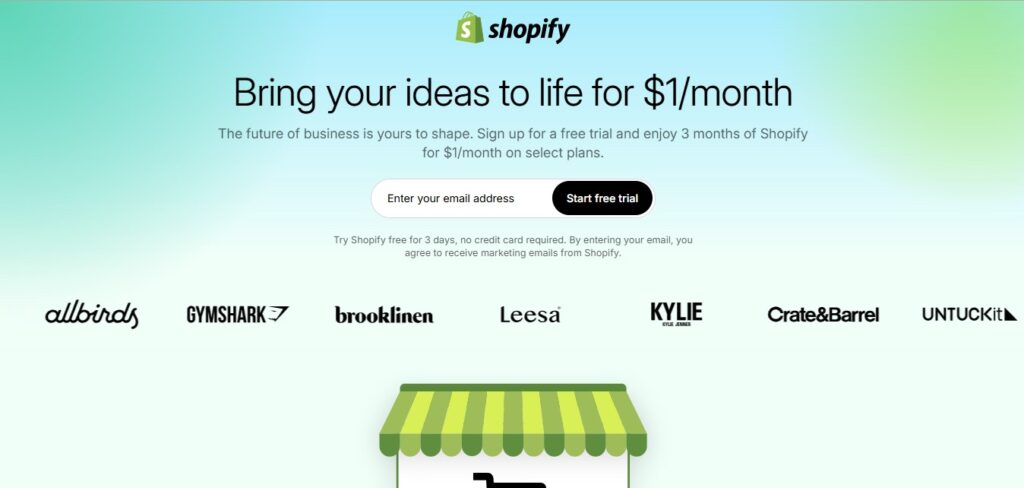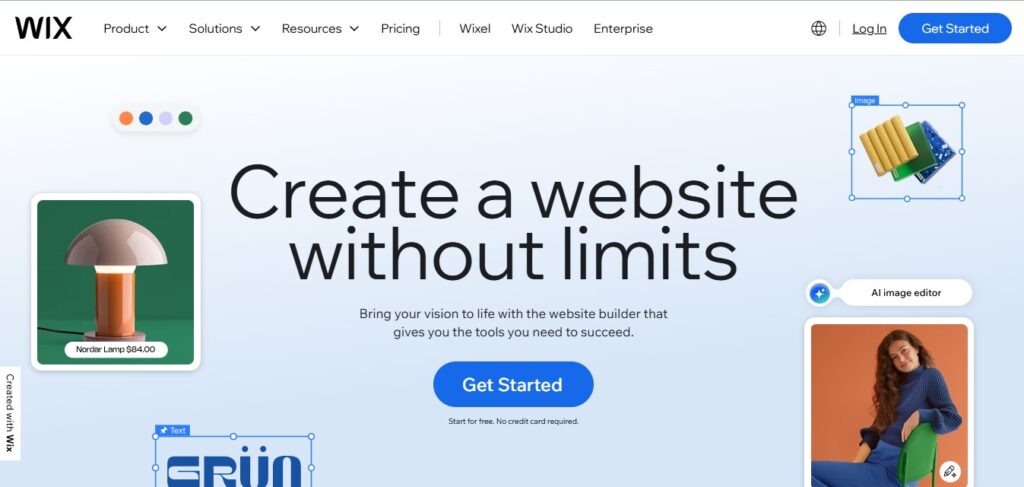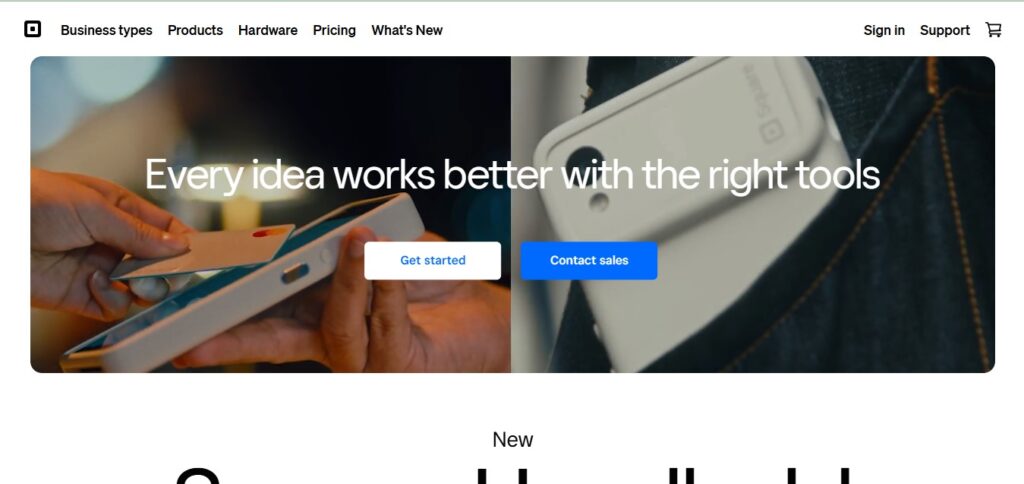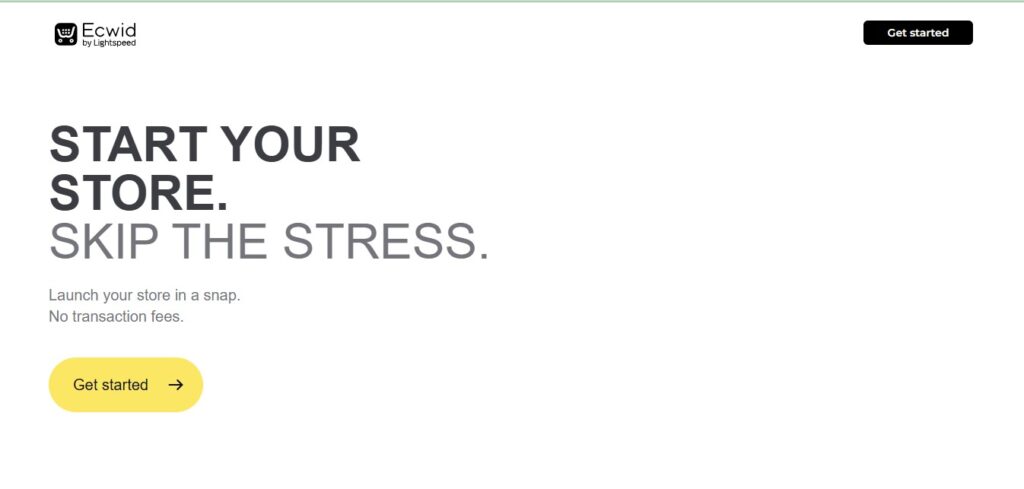Here are the 5 Best Ecommerce website builders for 2025.
Launching an online store today doesn’t need massive upfront cost. We’ve rigorously tested and analyzed the top free ecommerce platforms to bring you this comprehensive guide. Each entry includes detailed breakdowns of features, integrations, and honest pros and cons to help you make the perfect choice for your business.
Best for: Entrepreneurs who want to scale quickly
| Name | Description | Details | |
|---|---|---|---|
| 1 | Shopify | Best for full-featured online stores |
Free trial available
From $29/month (billed annually)
Website
|
| 2 | Wix | Best for design flexibility |
Free plan available
From $16/month (billed annually)
Website
|
| 3 | Square | Best for in-person and online sales |
Free plan available
From $12/month (billed monthly)
Website
|
| 4 | Ecwid | Best for multichannel selling |
Free plan available
From $14.08/month (billed annually)
Website
|
| 5 | Big Cartel | Best for artists and makers |
Free plan available
From $9.99/month (billed monthly)
Website
|
1. Shopify (Free Trial + Starter Plan)

Shopify remains the gold standard for online stores, offering a 3-day free trial followed by an affordable $5/month Starter Plan. While not entirely free long-term, its unmatched app ecosystem, 24/7 support, and seamless payment processing make it ideal for serious sellers.
Key Features: Shopify offers a polished ecommerce platform with a free 3-day trial and affordable $5/month Starter Plan, featuring mobile-optimized storefronts, abandoned cart recovery, and basic analytics. You get access to Shopify’s powerful POS system, inventory management, and the ability to sell across multiple channels including Facebook and Instagram. The platform supports unlimited products even on the Starter Plan, includes secure checkout options, and provides 24/7 customer support, though advanced features require upgrading to higher tiers.
Key Features:
- Free 3-day trial + $5/month Starter Plan
- Mobile-optimized storefronts
- Abandoned cart recovery
- Basic analytics dashboard
- Shopify POS integration
Integrations:
- 6,000+ apps in Shopify App Store
- Direct API connections with leading social commerce marketplaces including Meta and TikTok shopping platforms
- Compatibility with leading payment processors
Pros:
- Industry-leading uptime (99.99%)
- Best-in-class customer support
- Easy dropshipping through Oberlo
Cons:
- Not completely free long-term
- Transaction fees unless using Shopify Payments
- Starter Plan has limited features
Looking for a Reliable AI Plagiarism Checker?
Ensure your content’s originality with the best AI-powered plagiarism detection tool available today.
Discover the Best AI Plagiarism CheckerClick above to compare features and find the perfect solution for your needs.
2. Wix eCommerce (Free Plan)

Wix’s free plan includes ecommerce functionality, making it perfect for creatives and small businesses. Its intuitive editor, stunning templates, and built-in marketing tools help you launch quickly—though you’ll need to upgrade to remove Wix ads.
Best for: Creatives and small businesses
Key Features: Wix provides a beginner-friendly drag-and-drop website builder with 500+ professionally designed templates and mobile editing capabilities. The free plan includes basic ecommerce functionality for physical and digital products, built-in SEO tools, and multichannel selling options. You’ll get access to Wix’s artificial design intelligence (ADI) for quick store setup, inventory tracking for up to 500MB of products, and integration with major payment processors, though storage is limited on the free tier.
Key Features:
- Drag-and-drop website builder
- 500+ designer templates
- Responsive mobile editor to optimize store appearance
Technical Tone:
Responsive mobile editing interface for optimized store presentation
- Built-in SEO tools
- Multichannel selling
Integrations:
- Connects with 250+ apps
- Payment options: PayPal, Stripe, Square
- Shipping carrier integrations
Pros:
- Most intuitive editor available
- Beautiful, modern templates
- Good inventory management
Cons:
- Wix branding on free plan
- Limited storage (500MB free)
- Advanced features require upgrade
3. Square Online (Free Forever Plan)

Square Online stands out with a truly free plan (no trial limits) and seamless integration with Square POS. If you sell in-person and online, this is a top pick—just note that Square branding appears on your store unless you upgrade.
Best for: Brick-and-mortar businesses going online
Key Features: Square Online stands out with its completely free forever plan that includes unlimited products, real-time shipping calculations, and curbside pickup options. The platform offers seamless integration with Square POS for brick-and-mortar businesses, automatic tax calculations, and basic inventory management. You can sell across multiple channels including Instagram and Facebook, with no transaction fees when using Square payments, though design customization options are somewhat limited.
Key Features:
- Unlimited products even on free plan
- Real-time shipping calculations
- Curbside pickup options
- Automatic tax calculations
Integrations:
- Full Square POS ecosystem
- Instagram and Facebook selling
- QuickBooks accounting sync
Pros:
- Truly free forever option
- Best POS integration available
- No transaction fees
Cons:
- Square branding on free plan
- Limited design customization
- Basic reporting only
Conduct Industry Analysis in Seconds – For Free!
Discover how QuantexFlow can help you quickly analyze any industry with powerful AI-driven insights. Perfect for entrepreneurs, investors, and business analysts.
Try It Now – FreeNo credit card required. Get instant access to industry insights.
4. Ecwid by Lightspeed (Free Plan)

Ecwid’s free plan lets you embed a store into an existing WordPress, Wix, or social media page. It supports 10 products and handles inventory sync across platforms—ideal for testing ecommerce without rebuilding your website.
Best for: Adding ecommerce to existing sites
Key Features: Ecwid specializes in adding ecommerce functionality to existing websites with its free plan supporting up to 10 products. The platform features multichannel inventory synchronization, mobile-optimized checkout, and digital product delivery capabilities. You’ll get access to basic product options and variations, coupon creation tools, and integration with popular website builders like WordPress and Wix, though advanced features require upgrading.
Key Features:
- Sell on multiple platforms simultaneously
- Inventory synchronization
- Mobile-optimized checkout
- Digital product delivery
Integrations:
- WordPress, Wix, Squarespace plugins
- Facebook and Instagram shops
- 50+ payment gateways
Pros:
- Seamless integration with any website
- Multichannel inventory management
- Good for international sellers
Cons:
- Only 10 products on free plan
- Limited design control
- Basic features only
5. Big Cartel (Free for 5 Products)

Designed for indie sellers, Big Cartel’s free tier accommodates up to 5 products. Its minimalist design and artist-friendly features (like print-on-demand integrations) make it a favorite for creatives.
Key Features: Big Cartel offers a simple, artist-focused platform with its free plan supporting up to 5 products. The service includes customizable themes, basic inventory tracking, and discount code creation. You’ll get Google Analytics integration, PayPal payment processing, and Instagram shopping connectivity, with no transaction fees. The platform emphasizes clean product displays and straightforward management, though it lacks more advanced ecommerce features.
Key Features:
- Simple, clean product pages
- Customizable themes
- Inventory tracking
- Basic discount codes
Integrations:
- Google Analytics
- PayPal payments
- Instagram shopping
Pros:
- Made specifically for creatives
- No transaction fees
- Extremely easy to use
Cons:
- Very limited (5 products max free)
- No abandoned cart recovery
- Few advanced features
Final Recommendations
For most beginners, Square Online offers the best truly free experience, while Shopify’s Starter Plan provides the clearest path to scaling. Creatives will love Big Cartel, while WordPress users should choose WooCommerce.
Which features matter most for your business? Let us know in the comments!
Frequently Asked Questions
About the 5 Best Free Ecommerce Website Builders for 2025
1. Are these website builders really free?
Yes! All the platforms listed offer free plans or free trials, though some have limitations (like transaction fees or branding). Paid upgrades unlock more features (e.g., custom domains, lower fees).
2. Which builder is best for beginners?
Wix and SITE123 are the most beginner-friendly with drag-and-drop editors. Ecwid is great if you already have a website and just need to add a store.
3. Can I sell products without paying anything?
Yes, but with restrictions. For example:
- Big Cartel’s free plan allows 5 products.
- Ecwid lets you list up to 10 products.
- Square has no product limits but charges 2.9% + $0.30 per transaction.
4. Do these platforms charge transaction fees?
Most free plans include transaction fees (e.g., 2–3% per sale). Upgrading to paid plans often reduces or removes these fees.
5. Can I use my own domain name?
Not on free plans (except Square, which allows it). Paid upgrades (usually $10–$20/month) let you connect a custom domain (e.g., yourstore.com).
6. Which builder scales best for growing businesses?
Shopify (paid) and Ecwid are ideal for scaling. For free options, Square offers the most flexibility as your sales grow.
7. Are there hidden costs?
Watch for:
- Payment processing fees (Stripe, PayPal, etc.)
- Premium apps/themes (some builders charge for advanced features)
- Domain hosting costs if you upgrade



Shopify seems like a solid choice for anyone serious about ecommerce, especially with its 3-day trial and affordable Starter Plan. The mobile-optimized storefronts and abandoned cart recovery are great features for boosting sales. I’m curious, though, how does the POS system compare to other platforms in terms of ease of use? Wix’s free plan is appealing for small businesses, but the ads might be a dealbreaker for some. Square Online’s forever free plan with unlimited products is impressive, but I wonder if the limited design options hinder creativity. Ecwid’s ability to embed a store into existing platforms is a game-changer for those already established elsewhere. Overall, it seems like each platform has its strengths, but which one would you recommend for a beginner looking to scale quickly?
If you’re serious about fast growth, Shopify’s balance of ease, features, and scalability makes it the best choice. Start with the $1/month (3-day trial) to test it, then upgrade as you scale.